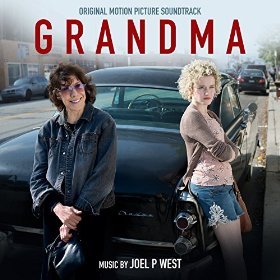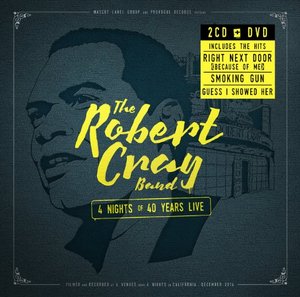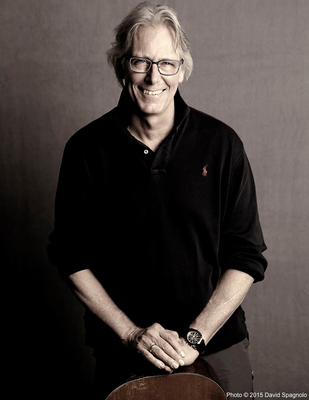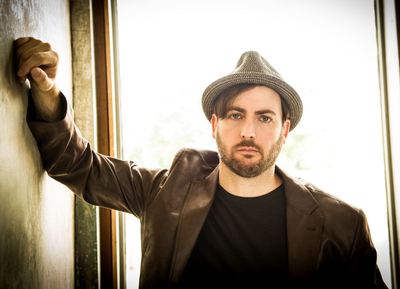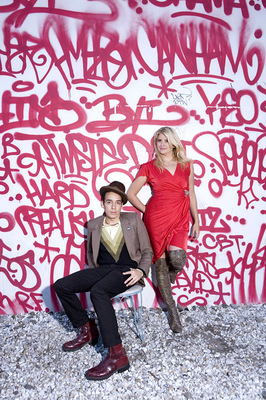THE FLOOD COATS' "THE BANKS" EXCLUSIVE FROM THE GRANDMA SOUNDTRACK ALBUM
Here's an exclusive song taken from the soundtrack to the upcoming Sony Pictures Classics film Grandma starring Lily Tomlin, which will be in theatres August 21st. It's by the band The Flood Coats, which was founded by the film score's composer Joel P. West. Lakeshore Records will release Grandma-Original Motion Picture Soundtrack on Friday, August 14th.
According to West...
"'The Banks' does not appear in the film, but is a sort of companion or postscript to the score. We used the same synthesizers, guitars, and harp, and the lyrics are inspired by the journey of reflection that Elle--Lily Tomlin--takes in the film. The song is about a place in the San Gabriel Foothills that looks back over the whole city and makes everything feel small and simple. It's about taking the time to get perspective on our day-to-day routines, to step back and reflect on where we come from and who we care about."
******************************
A Conversation with Robert Cray
Mike Ragogna: Your new album 4 Nights Of 40 Years Live selects highlights from four decades of your musical career. What are your thoughts forty years into this?
Robert Cray: We're out here and we're still having fun and we've done a lot more than we ever imagined when we started forty years ago. When I think back over the years, we've had a lot of fun and we continue to do so.
MR: Most current blues musicians don't really have the same roots as those masters who came before, their music coming from hardships and sorrow. So after all these years, how do you relate to the concept of traditional blues?
RC: When you mention the old guys, of course, there's no relationship whatsoever to those guys and their lifestyles and their relationship to their music. Of course the thing I'll be talking about is the same thing someone like Muddy Waters. He became popular. What was his relationship to it anymore, besides the fact that he grew up that way? My thing is I love playing the music, so I'm just doing it because I love it. The thing is, my relationship to what the blues is now, some of the songs that we write now pertain to what's going on around us in the immediate present. We've written about the wars going on, and they don't touch me personally so much but it's what's going on, so we write about the present. Mortgage crisis, homelessness, we talk about it.
MR: So blues has become a socially conscious genre since its beginnings were in suffering?
RC: Right. But you know what, blues has always had that socially conscious thing, too. We know the purveyors of the music in the earlier days as ones who went through that particular suffering lifestyle as opposed to now.
MR: Your album is a collection of music from your career and it's got all the hot numbers in it. When you were putting this together, what was the focus, on good performances or trying to capture the best highlights?
RC: Good performances. Normally during our shows, we try to capture a little bit of every time period. For what we did, as far as the DVD is concerned, some of the stuff is captured on the DVDs like "Smoking Gun" and a couple of the other ones that are really popular, we used footage from 1986 or '87 for those songs.
MR: What did the additional musicians who appear on the project bring to the creative mix for you? Do they understand your music?
RC: It's the relationship between all those different musicians and what they do to our music. It all has one common denominator and it's blues. Those guys do what they do because of the kind of music at the root of what they do, and we often relate.
MR: And that includes the first disc that features your current band.
RC: Yeah.
MR: What are your thoughts about the older performances on this project?
RC: Well the performances to me are surprisingly good. It cracks me up. I'm looking at that footage from 1982 with Mike Van Nuys playing tenor saxophone and organ and Warren Rand playing alto saxophone and Dave Olson playing drums back there and Richard and myself doing "T-Bone Shuffle," the band was kicking. Or when we did "Too Many Cooks," the band was kicking. I thought that was fantastic, and not just the way we look, with the caterpillar on my lip and all that stuff. We were just cracking up.
MR: You broke through as a blues artist during the eighties when America was rediscovering the blues.
RC: America was rediscovering that roots thing. I think that's also what enabled Stevie Ray and The Blasters and Los Lobos and The Fabulous Thunderbirds to all hit at the same time. The radio was playing it, and it was pretty cool.
MR: Do you think that was a reaction to maybe the more electronic and dance music that were happening?
RC: I think so.
MR: "Smoking Gun" is probably considered your greatest hit. What do you think it was about you as an artist and that song that resonated?
RC: I just think that it was something that was different, as far as what was being played on the radio. It was the performance, I think. I think the timing was right. Stevie Ray was the first of all of us to come with his style and break through on CBS Records and then everybody else fell in too.
MR: You have blues icons such as Eric Clapton, Buddy Guy, Keith Richards, Jimmie Vaughan and Bonnie Raitt paying tribute to you and your music. Are you surprised at how you've become considered a contemporary of these great artists?
RC: Yeah, I'm surprised, big time! I was surprised the first time somebody like Keith Richards wanted to pop in and sit in, or Mick Jagger showed up. He kind of walked in as we were walking in to do a show, we walked in in single file and I turned around and there was Mick Jagger and I went, "What the hell are you doing here?" It's just funny, but it's a great feeling.
MR: Which do you enjoy more, the live element or the recording studio?
RC: I enjoy the live environment more than the studio. The studio is great, it's creative, it's controlled, but in the live environment you don't know what's going to happen, your adrenaline is flowing and you want to be there one hundred percent of the time and you don't have control over everything, but you try to control it. That's what's fun.
MR: What about the improv element? Do you find yourself pushing boundaries still after all these years?
RC: Oh yeah, I'm always pushing to do something different with the stuff that we do, live on stage or with new material that we're writing. It's always a challenge to me not to go for rote. I hate that. We're not using a set list either. Nobody knows what's going to happen.
MR: To that point, are there any songs where you don't know where they're going to end up because you're having too much fun playing them?
RC: A lot of them have that element. There's a new song called "You Move Me" that we take to all kinds of weird places at the end of it, rocking it out. It's a challenge to try to do something different with that. That's fun. "Right Next Door," that's the way that goes at the end. There are others, too. It's just a blast. It happens with any given song on where the solos are going to go and how they're going to go.
MR: Are there any stories behind the scenes of any of the songs on this project, anything from the writing process to, I don't know, breaking strings on stage?
RC: I think you see everything that actually happened, we don't edit anything out from those things. What you see on the performances is what actually happened. I used to break a lot of strings, but then I moved to a Teflon-coated bridge saddle.
MR: [laughs] What about a favorite concert? Are there any that stick out in your mind?
RC: Well, The Belly Up was fun because it's a small place and it was hot and sticky. We chose a lot of different types of venues, but the Belly Up was fun because the people were right at your toes, with their beers on the lip of the stage and it's hot and funky and people are just ready. Kim Wilson was there and Steve was playing and we were packed tightly on this small stage. It was a workout, and it was a lot of fun. We were drenched in sweat having a really good time.
MR: Are there any on-the-road rituals that you and the band do? You know like singing a certain song or napping for an hour?
RC: [laughs] I know Richard Cousins goes and takes a nap before the shows now. Every day. He gets in the coach and he climbs in his bunk right after having dinner for an hour or so nap.
MR: Nice!
RC: We all have our little rituals. I like having a little quiet time before going on. My little ritual is having a cup of mint tea and just having a moment to myself whether it's completely quiet, or listening to a little bit of music beforehand. And then we all get together right before going on stage and we dance to the O. V. Wright track that we play before show, which is a song called "The Ace Of Spades." We dance to that and then we go out onstage and we hit it. We've done that for ages.
MR: What's the demo breakdown of the audience these days? Is it mainly fans who have been with you over the years or do you notice a larger young demo?
RC: It's mainly fans that have been with us over the years, but I get an opportunity to meet their kids, whether they come with their parents or they come on their own and they tell me that their parents turned them on to our music. Or the parents will say, "This is my son, he was conceived to your music" or something like that.
MR: Robert, what advice do you have for new artists?
RC: You're playing this music because you enjoy it. Today everybody's looking for quick fame, like all of those television shows. Nobody's going to put in the footwork, the heavy lifting, playing in the clubs and honing your craft. I just tell people to play the music if you enjoy it, and if you have the opportunity play with others and share in the love of the music. Do it for that reason.
MR: Is there anything from your experience that you wish young Robert Cray had learned sooner?
RC: Yeah, study a bit more about the music industry. There are a lot of sharks out there.
MR: You've had a lot of challenges, huh.
RC: I think everybody I know has.
MR: What's the next forty years of Robert Cray and his music going to be like?
RC: Who knows...but we'll be playing.
Transcribed by Galen Hawthorne
******************************
JON POUSETTE-DART'S "LET'S TALK ABOUT IT" EXCLUSIVE
Folk-rock singer-songwriter Jon Pousette-Dart released his 10th album, Talk, on July 24th. It was produced and recorded in Nashville by the talented and passionate Bil VornDick (Alison Krauss & New Grass Revival) and highlights a Nashville Who's Who of performers and co-writers.
Pousette-Dart has been creating music for four decades strong now, from his '70s days leading The Pousette-Dart Band (that supported the Frampton Comes Alive tour) and all the way to his solo work in the '90s and beyond, where he has written and performed with many on the American music scene.
According to Jon Pousette-Dart...
"Not long ago, I was sitting in the living room of my old friend Kostas Lazarides, in Montana, whom I had written several songs with in Nashville. We sat around with a few guitars with the intent to see what we might wring out of these old pieces of wood in our hands. I brought up the cold division that seems to have moved into the tide of the American politics and way of life. I remembered a time when people welcomed discourse from opposing views and exchanges of ideas. Somewhere this very special part of the American landscape seemed to slip away into a place where there were lines drawn, and no real tolerance to understand what it was like to walk in another man's shoes. Listening and considering what might be in a different set of ideas. This song and the title of the album came from that afternoon. I think it is a patriotic song of sorts as I love the very core of this country, and thank whoever there is to thank, probably my mom and dad, that I could wind up in such an amazing place, with so many possibilities as the USA. A place where so many people of every stripe and color can come together against all odds, and realize the possibility of living their dreams."
For more information: http://www.pousette-dart.com
******************************
JOHN ELLIS & DOUBLE-WIDE'S "BARBED WIRE BRITCHES" EXCLUSIVE
According to the John Ellis gang...
"Acclaimed saxophonist John Ellis returns on September 18 with Charm, the latest album from his New Orleans-meets-New York City band, Double-Wide. Formed in 2007, the quintet has proven to be a fertile and colorful outlet to ease the tension of Ellis' internal tug-of-war between NOLA and NYC. For this outing, Double-Wide is anchored as always by sousaphonist Matt Perrine and drummer Jason Marsalis, who lend the band its buoyant New Orleans groove. Gary Versace is featured on organ, piano and accordion. Leading the charge is the ever-versatile Ellis, who manages to play with a keen intellect while keeping his tongue in his cheek and a mischievous--but oh so charming--gleam in his eye."
Ellis has the following to say about the track...
"'Barbed Wire Britches' is a riff tune built around a bass line that I was hearing on the tuba. I'm pretty sure I came up with it in the shower. Unlike lots of the songs I write, this one has different numbered riffs that can be cued and played at different times. There are three different bass lines as well, two of them in G and one in E-flat, as well as a 'call' that is cued, which is used as a kind of release. The saxophone and trombone have a dialog during the open improvised section. The drum part that Jason Marsalis came up with on this one is really simple, but hooks up the whole tune in my opinion. As for the 'Barbed Wire Britches' part, well...it's a dance number, so you know...you're supposed to be compelled to move!"
******************************
JAS PATRICK'S "HARPY" EXCLUSIVE
The song for the "Harpy" video appears on Jas' (pronounced JACE) Patrick's upcoming EP, 'Inky Ovine,' which hits September 25th. He wrote, produced and played every instrument on the record himself with the exception of bass and pedal steel guitar. The latter was handled by his dad, who spent years playing with country legend Clint Black.
According to Jas Patrick...
"The 'Harpy' song and video are about preying on the helpless, unknowing, bewildered and those with no true capacity, artifice, resource or ability with which to protect themselves--either by design or powerlessness. I made the video with the intention of it being viewed as symbolism, metaphor and even somewhat a moving painting/tableau. But I very quickly found it became infinitely more interesting when viewers were asked, 'What do YOU think it means?' Every single person to whom I've shown the video had a different idea. Most humanized the characters, which I had not originally intended, as I wrote the characters to be metaphors and not 'real people'--but each person asked had their own take on what was happening, who was to blame, who was the victim and what it all meant. To be honest, I decided my own original interpretation paled in comparison and I gladly leave it to the viewer to enjoy without prejudice."
******************************
THE GOODNIGHT DARLINGS' "EMPIRE VAMPIRE" EXCLUSIVE
According to The Goodnight Darlings' camp...
"The duo Kat Auster (vocals), and Wilson Jaramillo (guitar, beats/synth) preview their upcoming EP All I Ever Wanted with the video for first single 'Empire Vampire' featuring performers from Cirque du Soleil, the Orlando Ballet, and more. Jaramillo has played guitar for singers including Lauryn Hill and Mary J. Blige. Auster is a Juilliard grad and previous rock singing coach on MTV "Made". The Village Voice has described her as "Gwen Stefani's evil twin."
Singer Kat Auster describes the video...
"Our video was directed by Sundance alumnus Roger Ingraham, and was shot in an abandoned 1920s mansion in Florida. Our collaborators include producer/creative director/choreographer Isis Masoud of Close-Up Experience. Isis was actually an old junior high school friend of mine! So here we are, an indie rock band collaborating with an up and coming dance company--but also childhood friends reuniting with a vision. Roger's message as a director encourages the artist to be their very best and allow themselves to be positively "transformed" by the project. This fits wonderfully with my song lyrics in 'Empire Vampire,' written about striving to get the most out of the city: 'Eat the apple all in one big bite,' 'Dance with greed, take the most of it!' Being part of the Empire of Vampires means being your most elevated self. My character in the video is a Goddess of Light inspiring positive change upon my Empire. Roger feels strongly about empowering women through Goddess iconography. I also feel very strongly about encouraging female power. The idea of positive transformation fits perfectly with the Close-Up Experience approach to dance production. Isis is educating these young dancers how to dance for the film medium through the experience of creating positive, inspiring art. Meet our 'Empire Vampire' Team... http://www.thegoodnightdarlings.com/team-vampire.html
For More Information: http://www.thegoodnightdarlings.com
Facefacebook: https://www.facebook.com/godarlings"

